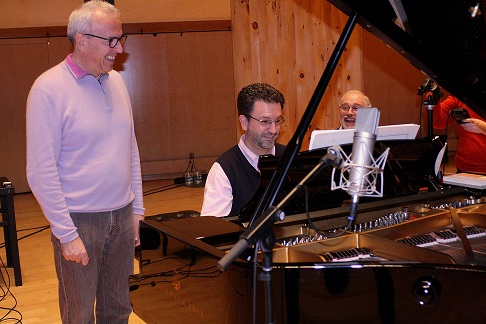 During the Poulenc CD set recording session, © Vincent Lapointe
During the Poulenc CD set recording session, © Vincent Lapointe
Montreal-born Olivier Godin enjoys a brilliant career as a pianist and coach in Canada and abroad. He is a vocal-coach at McGill University’s Schulich School of Music and is professor and director of the Opera Studio at the Conservatoire de Musique de Montréal. He also directs the Orford Arts Centre’s vocal accompaniment program at the summer academy.
Godin was one of the driving forces behind ATMA’s landmark recording of Francis Poulenc’s complete works for voice and piano, featuring singers Hélène Guilmette, Pascale Beaudin, Julie Fuchs, Julie Boulianne, François Le Roux, and Marc Boucher. Among the gems to be found are the first-ever recordings of three unpublished songs by Poulenc. This five-CD set is a joint production between ATMA, CLEF (Centre lyrique d’expression française) and Festival Classica.
When did you decide to devote so much of your career as a pianist to collaborating with singers?
I fell in love with this by accident, actually. I was still a student at the Conservatoire de musique de Montréal and I got a scholarship to study solo piano at the Music Academy of Western California in Santa Barbara. I was 18 or 19 years old and I knew nothing! I arrived there with my Rachmaninoff concertos my Prokofiev sonatas – you know, the big stuff. I felt really important because I knew this repertoire. At the time, there was also a program there for vocal collaborative piano – it’s funny because now I teach that at the Orford Arts Centre, and at the time I didn’t even know it existed. In that particular year there were not enough pianists registered for that program, so they asked some of the solo piano students if we were interested in doing this. I said yes, because I was curious and I knew absolutely nothing. They gave me some scores and said, “OK, learn these, we have a master class tomorrow.” So I did that. But what they forgot to tell me was that it was a public master class in front of 500 people with Marilyn Horne and Thomas Hampson! I started the hard way! But from that moment on, I never stopped. I was lucky to have friends in the vocal class at the conservatoire, so they would come to me to read through their new repertoire because their coach/teacher wasn’t always available. So that’s how I learned!
You are also an organist. How do you balance those two disciplines, which are quite distinct?
Actually, at first I wanted to be an organist. I was a little crazy when I was a kid, but I was eight years old and in my letter to Santa Claus I asked him for Bach organ music recordings! My mother was a librarian and there was this fantastic book with pictures of organs all over the world, and every two months I would ask her to bring that book home from the library where she worked. As a child, every time there was a concert with Raymond Daveluy, the great, great organist at the Oratoire Saint-Joseph du Mont-Royal, I would go. My parents realized, OK, this boy wants to do music. But they had the intelligence not to start me on the organ, they started me on piano instead. And then I fell in love with piano also. I pursued piano studies for many years, and then at the end of my masters at the Conservatoire I decided to also take organ classes, and that’s how I decided to play organ. I play a couple of organ concerts a year and I’m assistant organist at the Mary Queen of the World Cathedral in Montreal, but I must say that nowadays I don’t play as much organ as I used to.
How did this ambitious project celebrating the genius of Poulenc come together?
It came together because Poulenc is one of my absolute favourite composers, and I’ve always wanted to record a Poulenc CD. The idea came because we realized it was the 50th anniversary of Poulenc’s death. I work a lot with Marc Boucher and Pascale Beaudin, two of the singers on the CD, as well as François Le Roux when he is in Montreal or Paris. Also, I collaborate a lot with my colleague Richard Turp, who is the artistic adviser for the project. We realized that there was no truly complete recording by the same group of artists of the Poulenc songs performed by Francophone singers. There are two existing collections of the songs, one on EMI by some great artists, but they are not necessarily Francophones. The language is important for the sake of the poetry. When I hear Shakespeare, I definitely prefer to it performed by native English speakers. In Poulenc’s songs, the poems are by Éluard, Apollinaire, etc. and the shading of the language is very subtle. So it was very important to me to have Francophone singers for this reason. It’s also the first time the complete songs have been recorded over just one year. Pascal Rogé recorded a great four-CD set, but over some years. I had the idea of doing it with Richard Turp and invited the six singers, who are my dream team, my ideal cast and they all said yes!
One of the remarkable things about this CD is that you have included three unpublished songs that have never before been commercially recorded. Tell us about those songs.
Yes, we have three unpublished songs which have never been recorded, and were first performed by our singers at some summer festivals in Québec. One of them, Petit Complainte, is a bit of a joke, an unaccompanied duet that was found in Poulenc’s correspondence. Poulenc was very depressed at the time and wrote to Adrienne Monnier, joking about his miserable life.
The second one, Chanson de Marin, was a song Poulenc wrote for a 1951 movie called Le Voyage en Amérique by Henri Lavorel, written for Yvonne Printemps. The score was lost, and the only proof of the song’s existence was a very bad tape with a recording of the movie’s soundtrack. The movie is not available anymore, so we used this terrible tape. My father Michel Godin and François Le Roux reconstructed the text, and I transcribed the music. It took a long time! Julie Fuchs, a fantastic young French singer, premiered the song in concert and recorded it for us.
The third one, Viens! Une flute invisible, is very interesting. Hervé Lacombe, who wrote the superb new biography of Poulenc, and François Le Roux found a manuscript of Poulenc’s very first melody at the Bibliothèque Nationale de France. He was 13 and wrote it as a wedding gift for his sister. We used a photocopy of the manuscript. It’s really unbelievable to have this document in your hands! It has never been sung, never been performed, never been recorded. It’s like a pastiche of Debussy – there’s no Poulenc style at all yet, it’s very naïve. It’s set on a beautiful text by Victor Hugo.
Can you describe what makes Poulenc’s music unique?
The music is in contradiction with itself. It’s at the same time very spiritual and very earthy; very melancholic and humorous. It’s never just one thing. I think we all know that Poulenc was considered to be both a monk and a tramp, but I think he was always so true to himself. He didn’t take himself for granted. He said that he never had a system for writing music, it was always very spontaneous. At first it seems very complicated, but when you get to know his music, it’s so simple and spontaneous and I think he really wrote from the heart, more than with any kind of intellectual technique. In a way, spending a whole year with his music, I feel almost like I met him, that I made a new friend.
If music had not been possible as a career, what would you most likely be doing now?
There were two things I wanted to do when I was a kid: I wanted to be an archeologist. I was in love with places like Pompeii and all those sites where you find old things. It’s a little bit like what we do with music: we try to find new things about the past and truths about the past. I think it’s very close, very emotional also. As an artist and a musician, I like intellectual things as long as they are serving emotion and expression.
The second thing was cooking. I love cooking, I cook a lot and for me that’s a great hobby, not tiring at all. I think I would have had a restaurant or something like that. It’s further away from music, but it’s still creation.
What upcoming projects are on the horizon?
I’m very excited about the fact that as we launch the Poulenc CD, I’m also launching CLEF, the Centre lyrique d’expression française, which coproduced the CD with ATMA. I founded CLEF with Richard Turp and other friends to preserve and promote the French lyrical repertoire. We’re going to make sure forgotten composers are also remembered. We will hold masterclasses and conferences, and we’ll invite people like François Le Roux to do classes about French repertoire. It will be in collaboration with schools in Quebec and the rest of Canada. There will also be a website with a big database of repertoire. When we have some experience, we’ll look forward to co-producing projects – recordings and concerts.
The other project I must tell you about: we’re going to perform 170 songs by Poulenc at the Académie Francis Poulenc in Tours, France over four concerts on November 12, 14, 19 and 21. We are very excited about that!
Interview by Luisa Trisi, © ATMA Classique, 2013
